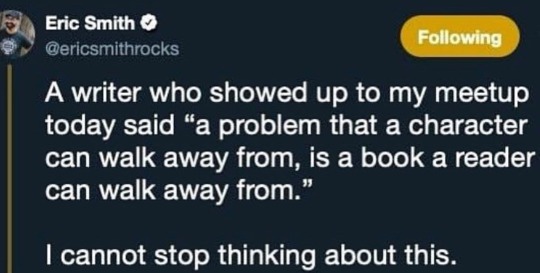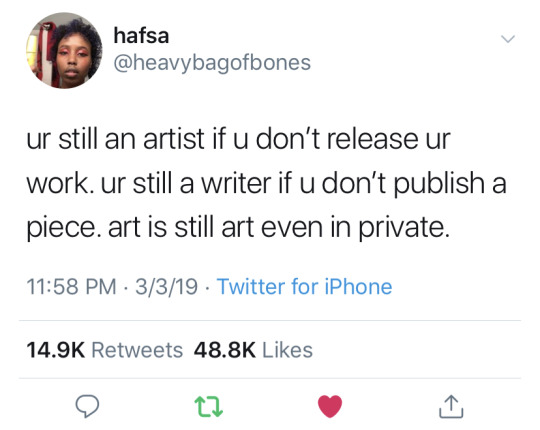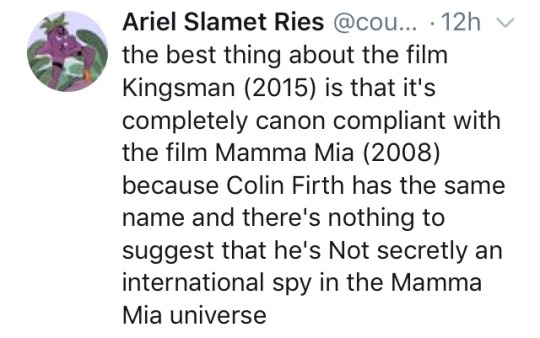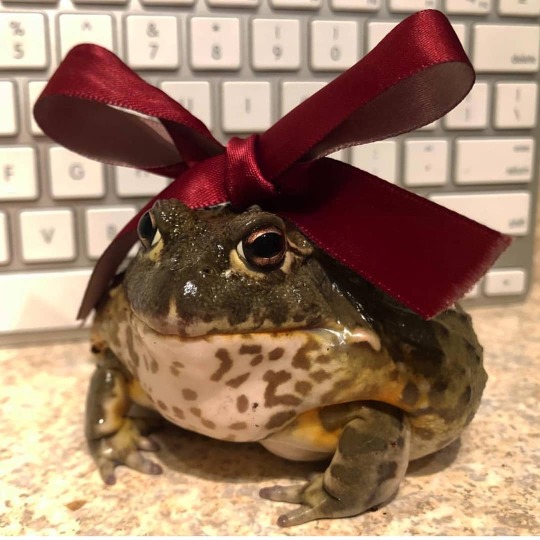Hey! I post stuff about writing, but I don't claim to know anything. Feel free to ask me if there´s anything you would like to know!
Don't wanna be here? Send us removal request.
Photo






I came to Winterfell because… I’m not the fighter I used to be. But I’d be honored to serve under your command, if you’ll have me.
Game of Thrones: 8.02 A Knight of the Seven Kingdoms
3K notes
·
View notes
Text
Story Writing Tips
@realentj gave me some writing tips I’ve been searching for my whole life. And since I never found them, I decided to articulate them for other people who - like me - are hacking their writing by following vague writing advice. Hopefully this helps at least one person 😊
Also, I’m not saying the examples I’ve given are good. I’m just trying to demonstrate mild improvement 😂

Common Advice Evils
Write what you know = vague. Write SOMETHING you know. Like emotions and feelings of the characters - that’s the reason we can read Sci Fi and fantasy.
Show, don’t tell = pages of wasted space. Maybe your character is a hypochondriac who can tell their heart is burning as tears run down their face, maybe they’re an emotionally unaware person who just goes ‘I was sad - idk why’. Say it like the character would.
More dialogue! = no. Dialogue is boring. More thoughts, thoughts about what people are saying. More thoughts than dialogue. NO: 'hi’ 'how’s it going?’ 'good thanks, you?’. YES: 'hi.’ She seemed flat today. I wondered why. 'How’s it going?’ Maybe she’d mention what was wrong.
Set the scene = too many pointless descriptions. Give us the character’s thoughts - if they don’t notice anything, don’t mention it. NO: I walked into the big room. The walls were red, there were three chandeliers, the floor was shiny, there were people everywhere. The room was hot, there were 15 candles… ’ YES: I walked into the room, immediately struck by the size. There were chandeliers on the roof, and I stood there, staring at them.
Avoid writing in the first person = terrible advice. I personally find writing in the first person easy - it helps me know what is and isn’t important to include.
Keep it simple = good advice. Overcomlicating your plot will bore the reader. You can have a complicated plot, but you’re gonna have to make it SEEM simple.
Let your character suffer = good, but don’t make them suffer for the sake of it. Suffering looks different for everyone, there’s a lot of wiggle room here. It could be as simple as offending a friend for a few days.
Just write = good advice! It doesn’t need to be perfect, I needs to be done.

My tips
Write scenes like a movie. This way you’ll have less pointless stuff, and something will always be happening for a reason.
Write images, not ideas. My brain seems to work like Brooklyn Nine-Nine or Scrubs, with all the cut scenes. Let your character think the same way if it’s right! So instead of: I thought about standing up on the table, in the middle of the room, and screaming. Everyone would probably stare at me if I did that. Try: I pictured myself standing on the table in the middle of the room, screaming, everyone staring at me.
Format things well. It makes it easier to read. If you press tab on a new line it gives it professional looking indents, and it’s much easier to read.
Get good at punctuation. This allows you to get the sound of real speech across while still being readable. So instead of: They were on the left and the right they were everywhere. Try: They were left, right - everywhere!
Don’t use semicolons. You’re probably not using them correctly, and they look obnoxious anyway. Use dashes instead. They’re harder to misuse, and they look much more conversational.
Don’t try. Just be honest. Writers who try tend to get bogged down in pointless metaphors and needless imagery. Just write.
Let the deeper meaning appear. Don’t force it. If you sit down to write a story about x, y, and z you’ll probably bore yourself to death.
Write about people. People like people. Even if you have the coolest plot in the world, no one will read it without people. All the best books almost sound boring when you describe them - they’re just about people.
Thoughts and feelings. Not descriptions and dialogue. This is what people read stories for, try to get them right. So while you can do: She had blue eyes, blonde hair, and a blue dress. She had a small face. I was a little scared of her. This tells us more about your character: She had blue eyes - that was the first thing I noticed about her. They felt cold, so I looked away. It describes less, but ways more about the thoughts and feelings of the character.
Be honest. Pls don’t sit down and try to skip straight to being Tolkien or Keats. Your writing will sound so forced and inflated…. Just be honest when you write.
Write casually. This is a good way to learn to write well, because you won’t be distracted trying to sound smart.
Cut words. Any word you can cut, cut it. Pronouns, conjunctions, phrases that could be turned into one word…. Cut 'em. So instead of writing: He was running after me, and I needed to escape. I ran away quickly, breathing heavily. I didn’t know where to go. Try: He ran after me - I needed to escape. Running, breathing heavily - I didn’t know where to turn.
CONSISTENT CHARACTERS. Maybe it’s totally believable your uptight character suddenly wants to do drugs - but you better make sure it is. Don’t make your characters do things for the sake of it. If you want your uptight character to do drugs but can’t think of a reason why they would, be more creative - maybe it could be an accident? People hate inconsistent characters, and saying 'they’re not inconsistent because they’re my characters’ is just lazy. My biggest pet peeve: Characters ending up together when they really wouldn’t. Don’t do it.
Say it how the character would. This means you CAN tell, you don’t ways have to show! You can totally just write: it was a big house. Didn’t think much of the colour though.
Point out things the character cares about. Don’t bother describing everything in the house if the character doesn’t think it’s important. Your character can walk into a mansion and literally be like: x-box. That’s all I saw.
Explain your character’s feelings. Sometimes having them cry and say they’re sad isn’t enough. If you do this well, the reader should feel something too. So instead of just: She was upset with me, so I began crying. I was sorry to let her down. You could try: I’d let her down - she was so upset, she was crying, all because of me. I began to cry too, angry that I couldn’t be better, stronger. Obvs don’t overdo it 😂
Let your character’s thoughts ramble. You can even let them cut themselves off mid sentence. Instead of: I tried to figure it out. Was it possible that she flew? No, that seemed to be taking things a little too far. Try: I mean, I suppose it was possible that - no. No, that was a little too far.
Don’t over explain things. Say it the simplest, most obvious way and move on. You can always fix it later if you have to. The best writing is simple and honest.
Write down stuff that feels embarrassing and hurts. I don’t usually keep that stuff in its first form, but I do keep the essence. It’s helpful to see it written down and realise what you’re going for.
Let your character miss things. This works particularly well in first person. It means you don’t have to explain or describe every single thing, it’s very relieving.
Find your voice. Your character’s voice that is. You don’t need your voice, you need to hear your character. I like to pick a person and write as if they’re talking. They can even have multiple voices, like a lot of people have when they’re aeghong or talking to themself. If you can hear your character’s voice, it will be harder to write them doing something they would never do - you just won’t be able to see it.
Have fun! Write things you think are fun - play around with your writing.
Love your story. Even if you don’t like the way you’ve done it, love the story. Learn to separate the story from the actual writing. That way you’ll be motivated to go back and fix it later.
Take advice. If you can find it, and it can be hard to come by. Try out anything suggested, you never know what might work!
Ignore the haters. That is, people who insult you and your writing without giving any tips. They’re just mean. So many famous authors weren’t published until at least 35. Writing is a skill, keep working on it!
Bonus tip: Don’t kill characters for the sake of it. It’s annoying. Character death should have a point. Yes, that point can be death can seem pointles, but that point doesn’t belong in every story, and it shouldn’t be repeated multiple times. Then you just look like a psycho and you’ll annoy the reader. Just - don’t do anything to your characters for the sake of it. Forced tribulation is annoying to the reader.
Bonus bonus tip: pls don’t write a story that hinges on a basic miscommunication. If it can be fixed in two minutes in a conversation, it’s probably a cliche… Definitely overused in films!

2K notes
·
View notes
Text
no offense but male protagonists whose strength comes from empathy, compassion and humanity will always be more interesting than snarky assholes who punch everything and treat everyone around them like shit
209K notes
·
View notes
Photo







And it’s finally done!
After reading so many amazing metas about how Jon’s and Sansa’s journeys are incredibly similar, I decided to make this gigantic fanart. I tried to merge some book descriptions to them, like Jon’s age at the first drawing and the fact that he used to carry Longclaw on his back (because he’s too short in the books).
Hope you like it!
12K notes
·
View notes
Photo

That’s absolutely how that interaction went down, right??
6K notes
·
View notes
Photo










We’re probably going to die soon. I want to know what it’s like before that happens.
6K notes
·
View notes
Text



I LOVE THESE OKAPI AND THEIR BIG SMILES SO MUCH
15K notes
·
View notes
Text

i really loved this advice so i had to share it with you
30K notes
·
View notes
Note
What advice do you have for writing a story with an unreliable narrator? I want to do this, but it sounds kind of hard and confusing.
Unreliable Narrators
The “Unreliable Narrator” is a literary device used when the writer wants to create conflicting layers of truth in a story for the purpose of leading the reader to question the story’s reality and wonder why the narrator’s perception is skewed. It’s not something you would want to just throw into any story for the heck of it. It’s a device you employ in a specific type of story, when misleading the reader is important to the narrative, such as in a mystery or when there’s going to be a huge, story changing plot twist.
Unreliable narrators work best in first-person, but they can sometimes work in third-person limited. Either way, the events of the story need to be filtered through the POV character’s perception, which is what allows the narrative to be twisted. There are three different types of unreliable narrators:
1. Intentionally Unreliable - these unreliable narrators are being willfully dishonest, usually because they’re trying to hide the truth.
2. Unknowingly Unreliable - these unreliable narrators think they’re being honest but they don’t have all the facts. They’re relating information as they understand it, believing it to be true even if it’s not.
3. Unintentionally Unreliable - these unreliable narrators are being dishonest, and deep down they probably know that on some level, but they want to believe what they are saying, so they create their own reality by embracing the lie.
Whichever type of unreliable narrator you use, it is essential that you drop hints as to the truth throughout the story, as these hints are what allow the reader to begin to question what the narrator is telling them. It’s also important that you drop hints as to why the narrator is being unreliable, as this allows them to look more closely at the character and begin to figure out what’s happening and why. Ultimately, there should come a point where the full truth is revealed, and even if your reader didn’t quite figure it out on their own, you want them to be able to look back and see all the hints that were there so that everything makes sense. You don’t want your reader to think everything’s fine and suddenly confront them with the fact that your character has been lying the whole time, as that tends to make the reader feel cheated.
I hope that helps you understand the device a little better!
381 notes
·
View notes
Text
Gonna try and start editing my nano draft soon. Let’s see if we’ll get these dragons flying
1 note
·
View note























